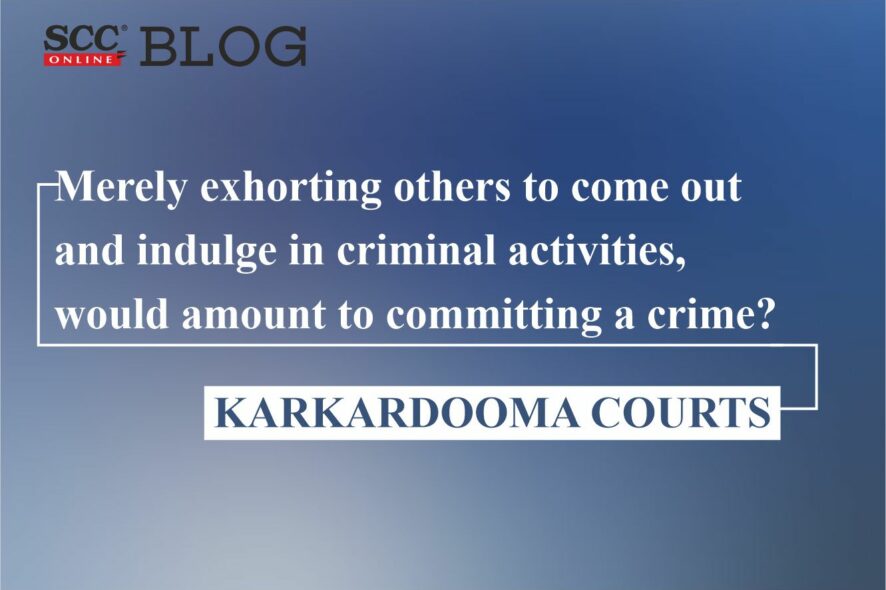Karkardooma Courts, Delhi: While addressing a case of alleged criminal conspiracy, Virender Bhat, ASJ-03, expressed that,
“The circumstances in a case, when taken together on their face value, should indicate the meeting of minds between the conspirator for the intended object of committing an illegal act or an act which is not illegal, by illegal means. A few bits here and a few bits there on which the prosecution relies cannot be held to be adequate for connecting the accused with the commission of crime of criminal conspiracy.”
The prosecution’s case was that the accused were members of an unlawful assembly on 25th and 26th February, 2020 and the object of which was to take revenge for the death of the several Hindus during riots and to teach Muslims a lesson, and in order to achieve the said, they hatched a conspiracy to which they bludgeoned to death innocent persons namely Aas Mohammad.
As per the charge sheet, three persons were apprehended, and their mobile phones were seized and the data was checked. As per the WhatsApp data on the phone of Mohit Sharma and Shivam Bhardwaj, it was revealed that they were members of the WhatsApp group “Kattar Hindu Ekta”. An accused Lokesh Solanki was found to be a member of this group and messages had also been sent to group by him.
Analysis, Law and Decision
Court expressed that the offence of criminal conspiracy has its foundation in an agreement to commit an offence, it consists not merely in the intention of two or more, but in the agreement of the two or more to do an unlawful act by unlawful means.
“…the essence of criminal conspiracy is an agreement to do an illegal act and such an agreement can be proved by direct evidence or by circumstantial evidence or both.”
Elaboration further with regard to conspiracy, Bench stated that it requires an act and an accompanying mental state.
To convict a person for the offence of conspiracy, the prosecution must show that he agreed with others that together they would accomplish the unlawful object of the conspiracy.
In the present matter, the only evidence with regards to hatching the conspiracy of the accused were the chats on the WhatsApp group “Kattar Hindu Ekta”.
On perusal of the chats, it nowhere indicated that the said group had been formed for any particular illegal object i.e., to kill the persons belonging to the Muslim community as well as to vandalize/burn their properties and that the members had agreed with each other that they would accomplish any such unlawful object of the conspiracy.
Infact, as per the Court’s opinion, the said chats revealed that the members were keeping themselves ready for any attack from other communities.
“There was nothing in the WhatsApp Chats to lead this Court to any conclusive or irresistible inference that the members of the group had agreed for any particular unlawful object and for accomplishment of that unlawful object.”
Further, the Court analyzed that the messages posted in the group nowhere indicated that the members had formed the requisite mental state to launch an offensive against the members of the other community and to commit vandalization/arson of their properties and kill them.
In fact as per the prosecution’s case, except for Lokesh Solanki, none of the other accused were a member of the said group, hence it would be unfathomable as to how an agreement between all the accused to do an illegal act can be inferred merely from the message posted in the said WhatsApp group.
In view of the above discussion, the charge of the conspiracy failed.
Another statement relied upon by the Special PP was of Nisar Ahmed who stated that the accused were asking Hindus to come out of their homes, to bring out the Muslims from their homes, kill them and rob/usurp their homes. Even if the said statement was taken at its face value, it would still only indicate exhortation.
For the above, Court stated that,
“Mere exhorting others to come out and indulge in criminal activities does not tantamount to any agreement between the person who holds out exhortation and the person to whom the exhortation is held out, to commit a crime.”
Therefore, no offence of criminal conspiracy was made out. [State v. Lokesh Kumar Solanki, 2022 SCC OnLine Dis Crt (Del) 20, decided on 15-3-2022]







